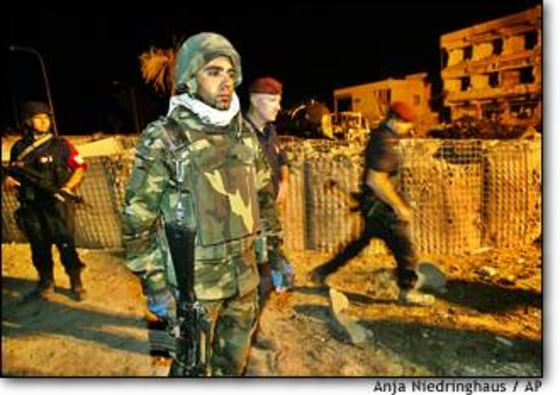Barely a week after Turkey rescinded its offer to send 20,000 troops into Iraq, Iraqi insurgents are targeting other foreign components of the U.S.-led coalition, adding new strains to a mission that is proving far more difficult than U.S. military planners had hoped.

TUESDAY’S SUICIDE bombing in Nasiriyah, which killed at least 17 Italian troops and eight Iraqis, followed the first death of a Polish soldier last week and several foiled attacks on British forces in the past week. The Polish officer died last Thursday after his convoy was ambushed in south-central Iraq.
While the devastating attack on the Italian contingent in Nasiriyah could still be an isolated incident, coalition officials were concerned that Iraqi insurgents may be trying to shake the determination of lesser members of the coalition by targeting their units.
“There frankly is no pattern, yet,” says a U.S. defense official. “But there have been more attacks on coalition forces generally, including American troops and our Iraqi allies. So we will be watching it closely.”
RELATIVELY UNSCATHED
Until Tuesday’s attacks, foreign contingents have fared well in Iraq. Britain, whose 11,000 troops represent the second largest force behind the United States, has lost 19 soldiers since “major combat” was declared over — more than half of those in air or traffic accidents. Poland lost an officer last week, Ukraine lost a soldier in a traffic accident in late September, and a Spanish navy officer died in the bombing of the U.N. headquarters on Aug. 19. Additionally, a Danish soldier died in a friendly-fire incident near Basra in July.
By and large, the governments remain steadfastly dedicated to the coalition. In Britain, where the Iraq war and questions about the government’s honesty in presenting the case for war have cut into Prime Minister Tony Blair’s popularity, defense officials are studying increased troop deployments, not withdrawals.
Opposition parties in Italy reinvigorated their call for a pullout of forces after Tuesday’s deaths, but Prime Minister Silvio Berlusconi, a conservative backer of the Iraq war, has vowed not to be intimidated by terrorism. Poland’s government made the same point late last week after it suffered its first casualty. Only Spain appears to be hedging slightly, and even then, has only withdrawn its diplomatic staff. Some 1,300 Spanish soldiers remain based in the An Najaf area.
DON’T EXPECT HELP
One thing that such attacks have accomplished is dimming prospects for major reinforcement from abroad. The pace of attacks on American forces in the country and the continuing unpopularity of the Iraq war and occupation in the eyes of many abroad has made major foreign deployments “highly unlikely” in the near future, says a U.S. official, requesting anonymity. Only a month ago, Secretary of State Colin Powell spoke optimistically about getting up to 40,000 foreign troops from nations like Turkey, Pakistan, South Korea and India to take the pressure off of American forces. Since then, all four governments have ruled out any major deployments, and Japan has suspended a plan to send logistical units.
The case of NATO member Turkey is particularly disturbing to U.S. policymakers. The Turkish government had been eager to repair damage with its ties with the U.S. after refusing to allow the U.S. 4th Infantry Division to deploy from its territory as the buildup to war proceeded.
Indeed, David Phillips, a senior fellow at the Council on Foreign Relations, notes that Turkey didn’t even agree to grant overflight rights to U.S. warplanes until after the war began. Many military analysts believe the lack of a “northern front,” which would have seen the 4th Infantry Division advance on Baghdad from the Turkish border, is partly to blame for the strength of resistance now present in the “Sunni triangle” north of the capital. The Turks had demanded up to $1 billion for every 1,000 soldiers traversing their territory — a figure that led to outrage in Washington.
SHOW ME THE MONEY
With U.S. backing for an $8.5 billion economic rescue package being dangled before it, the Turkish parliament voted to approve the deployment of up to 20,000 troops to Iraq.
But the deployment, State Department officials concede, will likely never happen. Turkey’s bitter enemies among Iraqi’s Kurds — but also among Iraqis who view Turkey as the former Ottoman colonial power, quickly objected to the idea. Within two weeks of the vote, Turkey had revised its position, insisting it would not deploy troops if prominent Iraqis would not welcome them. Last week, the offer was rescinded completely.
“We said from the beginning that we were not very eager” to send troops to Iraq, Turkey’s Foreign Minister Abdullah Gul told reporters last week. “We had said we would send troops if our contribution was to be useful. We saw that this was not the case, that’s why we made this decision.”
American analysts and at least one U.S. official questioned Gul’s sincerity. In fact, says Phillips, a former State Department adviser on postwar Iraq, the Turks were very eager to get troops into Iraq in order to influence the direction of its postwar development.
“The fact is, Turkey has had troops in northern Iraq for years. Ankara approached the Bush administration with an offer of troops in order to extend Turkey’s influence in Iraq,” says Phillips. “The administration wanted the troops, but they’re not ignorant of history. All too many Iraqis, not just the Kurds, reacted negatively to the notion of Turkish troops on Iraqi soil.”
Still, even though it will not be sending troops to Iraq, Turkey did get some of what it wanted: the $8.5 billion loan.
The State Department says that loan was never linked to the troop issue, though official department “guidance” says the loan is contingent on Turkey’s continued economic reforms and its “cooperation” in Iraq.
Phillips says the ‘who’ issue was handled terribly by the administration. “Pulling the loan at this point would just look petty and vengeful,” says Phillips, who has spent years on conflict mediation. “It is totally amateurish for the Pentagon to ask for troops, and then turn around and say ‘thanks but no thanks.’
